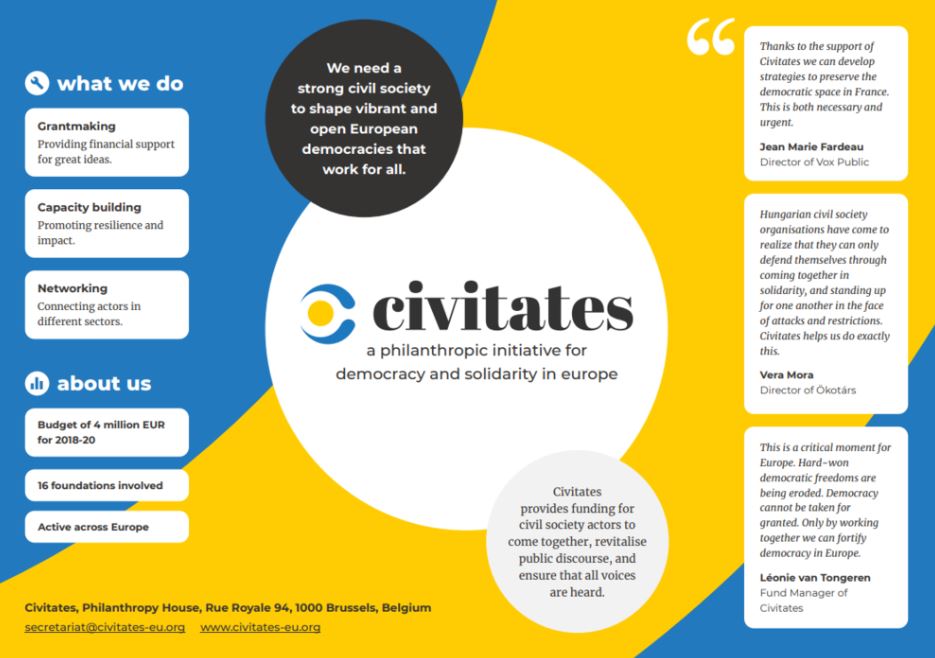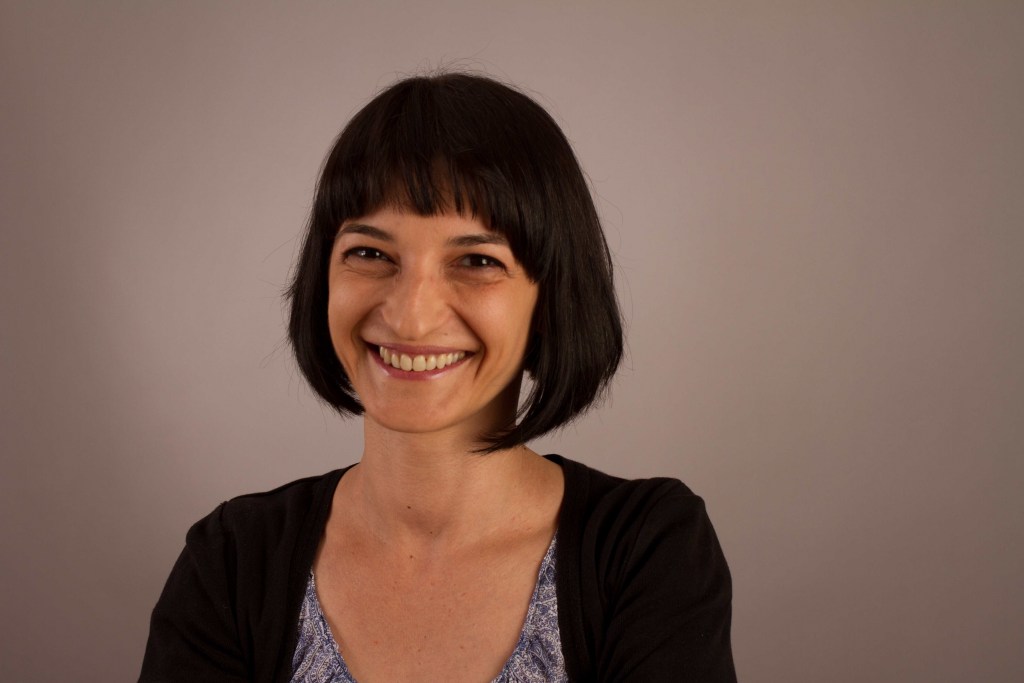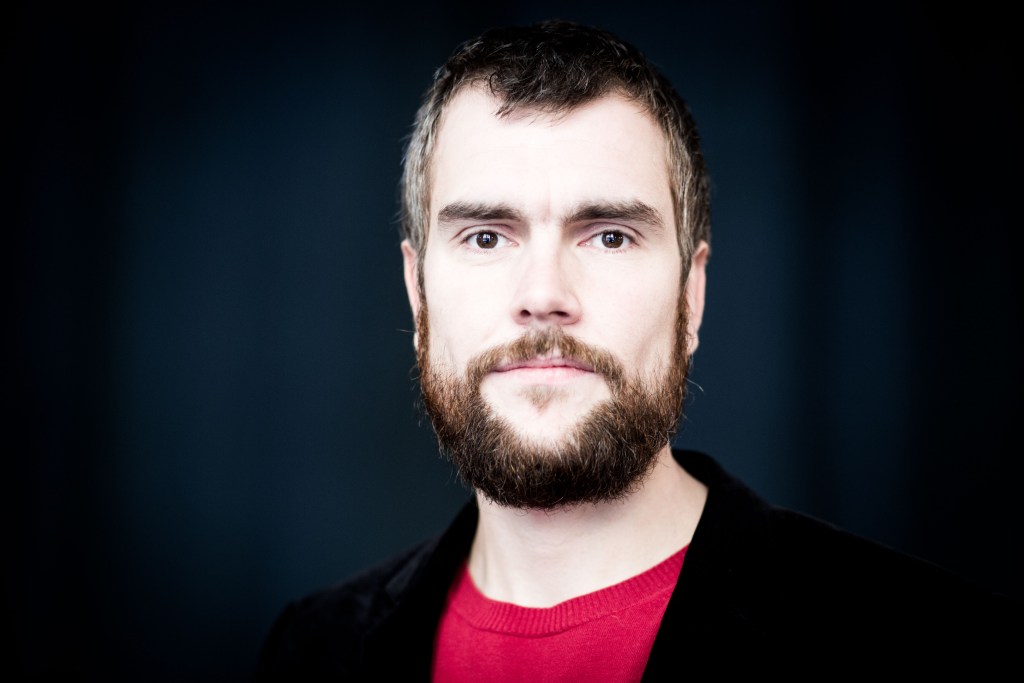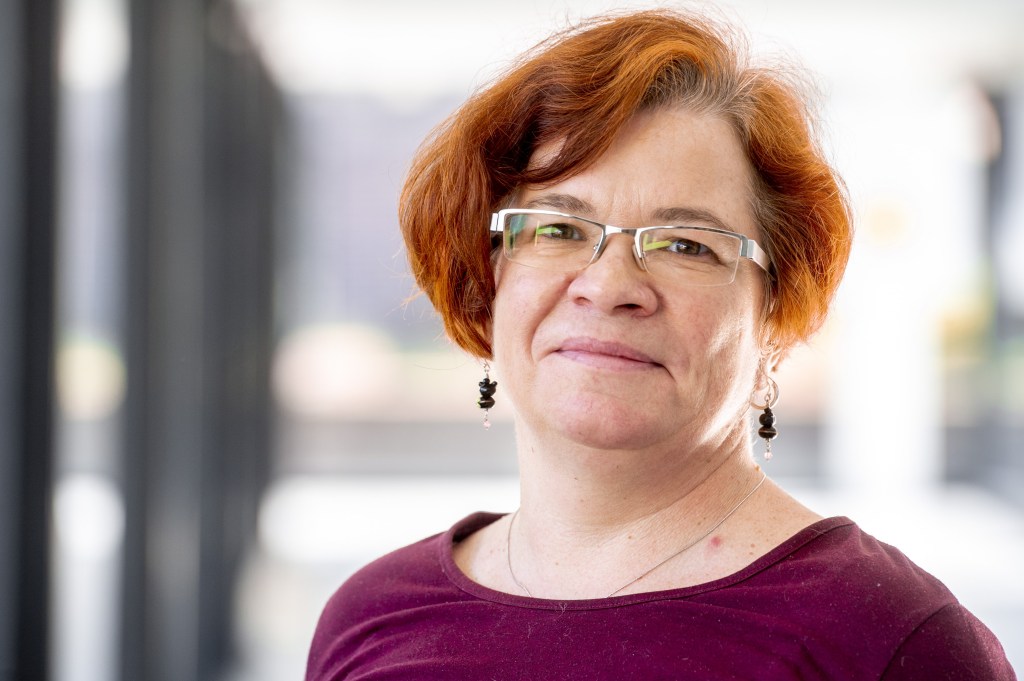Civitates: more grantee stories
31 Jul 2019
We are one of the participating foundations in CIVITATES – a philanthropic initiative for democracy and solidarity in Europe. Once in a while we like updating you on the grantees of the initiative. Please meet Oana Preda of CeRe [Romania], Milan Sagat of VIA IURIS [Slovakia] and Veronika Móra of Hungary’s Civilization Coalition.

Not long ago, Romanian NGOs active in the field of anti-corruption were described as foreign agents who had sold their souls to the enemy. Today, with support from Civitates, a new coalition of like-minded organizations works to improve regulations for civil society in the country. Oana Preda, as director of CeRe (‘Demand’), is one of the initiators of the new coalition.
Are there any recent developments in Romania with regard to the civic space?
Actually yes, two good things have happened. One of our main concerns was related to the implementation of the European Anti-Money Laundering Directive. For a long time, our coalition, together with many other organizations, has been trying to convince Members of Parliament to amend the law to be more favorable to NGOs. After many discussions the NGOs together succeeded; the law has been improved and approved by the Parliament. The last step is for the president to proclaim it. The other positive news is that the Parliament has rejected a bill that caused great concern among civic activists. It would have allowed for easier dissolution of NGOs and could have been used as another means to silence criticism in society. Fortunately, the Parliament rejected the bill.

Are NGOs often hindered in their work?
There have been some accusations that NGOs are endangering the nation. A government official posted the official medical diagnosis of a protester on Facebook, revealing his mental illness to the world and discrediting him. And then there was the anti-corruption protest last summer, where a lot of violence was used against peaceful protesters. That episode is now under investigation by the police.
You have recently set up a large coalition in Romania to fight incidents like these. What will be your first joint activity?
We have already cooperated in amending the law around anti-money laundering, and one of our short-term plans is to try to open a parliamentary debate on the country’s outdated public assembly legislation. The Minister of the Interior has informally announced his intention to modify the law, and we are quite sure that she will propose changes that we do not like. We will put forward some recommendations to ensure that if the law is modified it will be in a way that improves rather than limits democracy. Moreover, we propose a special committee at the Parliament, with constant participation of civil society, to address the legislation on civic space.
In earlier interviews you emphasized that it is important to demonstrate that you are a large, determined group in order to advocate successfully. How have you been mobilizing people?
We have literally gone from door to door to engage people, trying to identify who was ready to move outside their comfort zones and pinpointing the issues that bring people together in collective action. What did we learn? That people become engaged whenever their personal interests are affected, whenever they have the chance to address what they perceive as their problems. So that’s what we do; we try to engage people around their problems.
How did you get involved in this work?
I have worked in the sector since 1996, when I was a student. I wanted to make good use of my time and to better understand the labor market. I started to volunteer with the Pro Democracy Association, and since then have been working for NGOs. Sometimes the work gets frustrating, but it’s hard to imagine doing anything else.
What is your dream for Romania?
I hope that Romania will become a country where there is solidarity amongst groups of people, and where everyone, even vulnerable groups, can make their voice heard to decision makers.
Slovakia has long been known for having a relatively open and liberal climate for civil society actors. Over the past two years however, organizations have been under attack. Civitates, has funded a new coalition to reverse this trend. Milan Sagat is the executive director of VIA IURIS, the organization with which Slovakia’s first female and recently inaugurated president Zuzana Caputova worked for more than 15 years. VIA IURIS is leading a new coalition of civil society actors in Slovakia.
What is the current playing field for civic organizations in Slovakia?
Two years ago we saw signals that civil society in Slovakia might be under attack. At that time, many organizations were in denial. They said that there was no real threat, and that what happened in other countries would never happen in Slovakia. But then investigative journalist Jan Kuciak was murdered last year. This was followed by massive demonstrations organized by activists. Civil society became a target of hate speech and conspiracy theories, also in the political mainstream. Now the general perception among civic organizations has changed.
Is this all still topical with the new president in place?
Despite the election of a president who will fully support and protect civil society, I am quite realistic. Although her voice will be heard in the public discourse, the power of the president is limited. The parliamentary elections that take place in March 2020 will deal with the division of executive power. The new government could then make it really difficult for civic organizations to operate.

In January, Civitates supported VIA IURIS in the formation of a coalition of civic organizations in Slovakia. How far have you come since then?
We had already received a small amount of funding from Civitates last year to draft the roadmap. So when we started in January, the plan was ready. Now, a few months later, the coalition is almost formalized. We expect to start off with 20 to 30 members with different backgrounds from all over the country. The plan is to launch the platform in the autumn, as we still need to brainstorm with some creative people about the brand.
Is there anything in the process that inspired you, made you feel excited?
Having a group of organizations work together to defend the framework for civil society is like a dream come true for me. The creative work is really exciting and the prospective members are very engaged. They are not simply joining a formal platform; they have an honest and emotional interest in the issue.
What is your personal motivation to do this work?
I strongly believe in solidarity. It’s obvious that we are stronger together. Solidarity is a key value; we saw this in the cases of Hungary and Poland. It’s a pragmatic decision to work together to defend ourselves, but at the same time I think that the sole value of solidarity can really make our democracy stronger in the end.
What is your dream for Slovakia?
I just want Slovakia to be a normal country, governed decently. A place where I want to raise my kids. I feel that the work we do with VIA IURIS and the coalition enables this, and I am happy to be part of this mission.
The atmosphere of insecurity in Hungary has a chilling effect on civil society organizations, particularly those in rural areas. Civitates funds projects to strengthen democracy in Europe; for example Hungary’s Civilization coalition, which is ready to spring into action in case civic organizations are under attack. Veronika Móra, director of Ökotárs, is one of the leaders of the Civilization network in Hungary. The network aims to counter the trend of shrinking civil space and to promote a positive image of CSOs.
How would you describe the current operating environment for civil society in Hungary?
Even though no new legislation targeting civic organizations has recently been passed, the psychological threat is present. This is why the Civilization coalition is on ‘standby’; we maintain readiness in the case of any further harassment of civil society. In order to be able to withstand possible attacks, it is important for us to join forces with as many partners as possible. This is why we try to find organizations in the countryside, in areas where we’ve seen a lower level of civic activism. It has turned out to be quite difficult to find local organizations that are willing to engage with us. The unpredictable environment makes them keep a distance from anything that could be seen as political, as their dependence on local institutions is very strong. If you’re not friends with the local government, it’s basically impossible to do anything. Municipalities and state institutions are also often important employers. So, for example, if your partner works in a school and you do something that the mayor doesn’t like, this could have repercussions, also on the personal level.

Did you succeed in connecting with new organizations active on the national level?
Yes. We organized a joint campaign around the Hungarian 1% Law, whereby a person can assign 1% of his or her personal income taxes from the previous year to support the activities of a non-profit organization without any loss to their earnings. This campaign involved a wide range of organizations, from outside the Civilization coalition, including charities that are collecting significant amounts of the 1% income. As less than half of Hungarian taxpayers currently make use of this opportunity, our campaign encouraged people to give their 1% to civic organizations. The main tool we used was a social media campaign featuring a music video clip, which was unusual and unprecedented for organizations like ours. Our evaluation showed that we managed to cooperate with a large group of organizations and that we should keep working together. There are ideas for continuing this cooperation, and we are discussing which direction to take with the partners.
What is your personal drive to do this work?
I have always liked to enable others to do good stuff. Ökotárs is a good place for that, because that is what we do: provide support and give grants and trainings to enable others to work for the public good, either through community organizing or environmental matters.
What is your dream for Hungary?
That it becomes a country for all: where everyone can stand up for themselves without fear, where everyone can experience and enjoy their freedoms and rights, and where people turn with empathy and solidarity to one another. Of course, in order to achieve this we need a positive political environment instead of the hate and fearmongering that we live among today. And oh yes, a meaningful and implemented climate policy.
